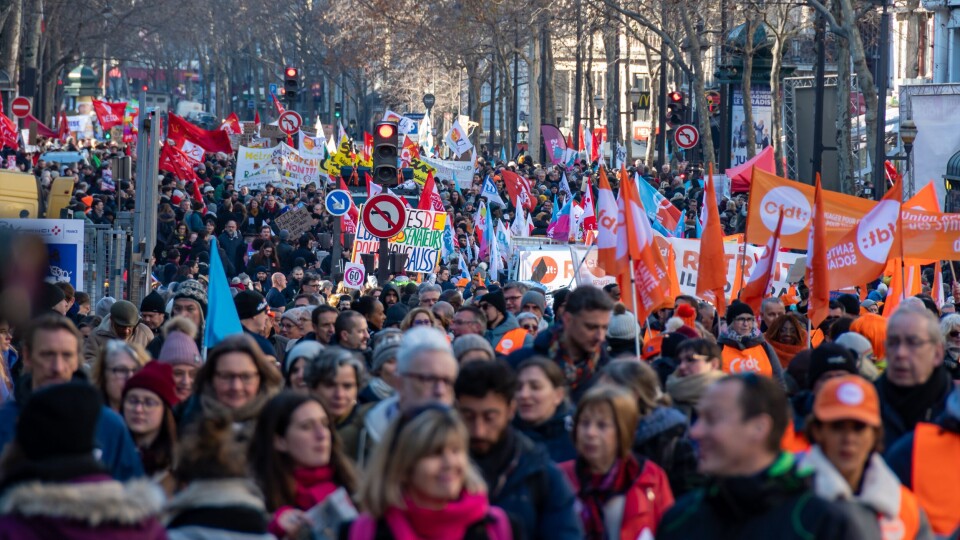-
French weekly weather forecast January 19 - 23: colder and lots of rain
Flash flood alerts are in place on Monday January 19 in Corsica, Aude and Pyrénées-Orientales
-
French woman given one-year sentence for hiring men to evict squatter
Homeowner from south-west found guilty by Bordeaux criminal court
-
Drinking tap water restricted for children in south-west France communes
Haute Garonne prefecture says the measure is precautionary and due to high chlorate levels
Strikes? New government? What’s next amid France’s pensions anger?
The French government sparked fury on Thursday by using article 49.3 to force through controversial pension reforms without a vote in parliament

Amid the anger sparked by the French government pushing its pension reforms through parliament without a vote on Thursday (March 16), we ask: what happens next?
Read more: Fury as French PM forces through pension reforms without a vote
Will there be more protests and strikes?
Yes.
On Thursday evening, several thousands of people took to the streets in several cities across France, including Paris, Nantes and Marseille.
Tensions à la Concorde. Jets de projectiles et lacrymogènes. Le canon à eau de la police entre en action. #réformedesretraites pic.twitter.com/PwdsL1v6XG
— Hippolyte Radisson (@H_Radisson) March 16, 2023
Early on Friday morning, around 200 protesters stopped traffic on Paris’ ring road to signal their opposition to the use of article 49.3.
There were other protests across France on Friday, including in Rennes.
Marseille port was blocked and P&O Ferries suspended its sailings to Calais for a large part of the day due to industrial action there.
Trains were interrupted at Toulon and Bordeaux after demonstrators split onto the tracks.
🇫🇷 FLASH - Des centaines de manifestants contre la réforme des retraites ont envahi les voies de la gare de #Toulon. La circulation des trains a été interrompue. (Var-Matin) #greve17mars #grevegenerale pic.twitter.com/Arqe5E9qjQ
— Mediavenir (@Mediavenir) March 17, 2023
Meanwhile, several education unions are calling for a supervisors' strike next week, when the baccalaureate speciality exams are set to begin.
Unions have also called for protests at the weekend and next Thursday (March 23).
Read also: Paris mayor kicks up a stink over bid to end bin collectors’ strike
Will this threaten the government?
It is possible.
Normal protocol states that after the use of article 49.3, any opponents are permitted to ‘topple’ the government if they successfully propose a vote of no confidence that receives enough support from MPs.
On Friday, a group of MPs submitted a request for a vote of no confidence in the government.
MPs from the independent group LIOT (Libertés, Indépendants, Outre-mer et Territoires) said they had 91 signatures from five different opposition factions in the French parliament.
Even at the time of announcing the use of the 49.3 on Thursday, France’s prime minister Élisabeth Borne said she was anticipating a no-confidence vote being held.
The no-confidence vote is set to be debated in parliament on Monday (March 20).
To succeed, an absolute majority of MPs (289) must vote in favour.
If that happens, President Emmanuel Macron would have to approve a new government or dissolve parliament.
Dissolving parliament would automatically trigger new legislative elections, which must take place within 20-40 days.
This could be a risky move for the government, as there is no guarantee that it will get a majority in parliament in the event of a new vote.
In the Fifth Republic, Charles de Gaulle dissolved parliament twice, in 1962 and 1968, as did François Mitterrand in 1981 and 1988. The last time it happened was in 1997, under Jacques Chirac.
Related articles
Why we are on the side of French pension reform strikers
Explainer: What is France’s article 49.3 and why is it in the news?
























